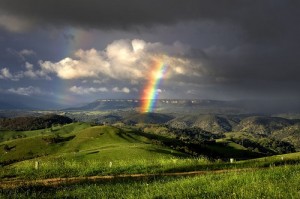by Eugene Peterson
The way in which this sacramental sense shapes our relation to our environment is expressed in the middle lines of the prayer.
The sea looked and fled,
Jordan turned back.
The mountains skipped like rams,
The hill like lambs.
—- vv.3-4
At one level, this is simply a colorful account of the Exodus: “The sea looked and fled.” In the more sober language of prose, this is the story of Israel. Fleeing from the Egyptians and then blocked at the waters of the Red Sea, the people walked through on dry land after Moses struck the waters with his staff and waters parted. God “provided a way of escape.” “Jordan turned back” remembers Israel’s being prevented by the formidable Jordan River from entering the Promised Land at the conclusion of her forty years’ wilderness trek. Then Joshua struck the waters and began their conquest of the land. God provided a way of victory. In the poetry of the psalmist “the mountains skipped like rams, the hills like lambs” is the story of the long wait of the people at the base of Sinai — the people standing in awe before the volcano-rumbling and earthquake-shaking mountain, while Moses was on the heights receiving the law.
Why not say it plainly? For one thing, God’s action and presence among us is so beyond our comprehension that sober description and accurate definition are no longer functional. The levels of reality here are so beyond us that they invite extravagance of language. But the language, though extravagant, is not exaggerated. All language is inadequate and falls short. The picture of the Red Sea as a fleeing jackal, the Jordan as a cowardly sentinel forsaking his post, the Sinai as frolicking rams and lambs, is not, of course, a journalistic account of what happened, but neither is it the fabrication of an unhinged imagination. The somersaulting of what everyone had assumed to be the limitations of reality (the Red Sea and the Jordan River) and the unexpected outpouring of energy where there was nothing but a huge, dead, granite outcropping in the dead desert (Sinai) called for the new use of old words.
Wendell Berry says it well: “The earth is not dead, like the concept of property, but is as vividly and intricately alive as a man or a woman and … there is a delicate interdependence between its life and our own.” And so the imaginative statement “the mountains skip like rams” is not mere illustration portray the exuberance of the Sinai revelation. It is a penetrating realization that the earth itself responds to and participates in the revelation. Paul used a different, though just as striking, image for the action — “We know that the whole creation has been groaning as in the pains of childbirth right up to the present time. Not only so, but we ourselves” (Romans 8:22-23). Metaphor and simile do not explain; they draw us from being outsiders into being insiders, involved with all reality spoken into being by God’s word.
Tremble, O Earth
The personal that is at the heart of the natural is expressed in the final stanza.
Tremble, O earth, at the presence of the Lord,
at the presence of the God of Jacob,
who turns the rock into a pool of water,
the flint into a spring of water.
—- vv.7-8
Tremble here reaches for the transcendental: awed respect, reverent humility. Promethean man trembles before neither earth nor altar; he takes charge. Technological man trembles before neither forest nor angel host; he operates his calculator unemotionally with steady hands. People at prayer tremble, along with the whole creation that “waits in eager expectation” (Romans 8:19) and in hopeful adoration before the mystery of creation and redemption in which “in all things God works for the good” (Romans 8:28).
Paul attempted to trace the process with the ponderous theological terms predestination, justification, glorification. Later he returned to the more fundamental language of prayer. “Oh, the depth of the riches of the wisdom and knowledge of God! How unsearchable his judgments, and his paths beyond tracing out!” (Romans 11:33). Here we find ourselves closer to the reality and in the presence of God’s action, rather than just thinking about it.
Eugene H. Petersonis a pastor, scholar, author, and poet. He has written over thirty books, including Gold Medallion Book Award winner The Message: The Bible in Contemporary Language(Navpress Publishing Group, 2002), a contemporary paraphrase of the Bible. This excerpt appeared in The Best Preaching on Earth edited by Stan L. LeQuire and published by Judson Press in collaboration with the Evangelical Environmental Network in 1996. This is the third of a four part series on the theme of Creation in the Psalms.











